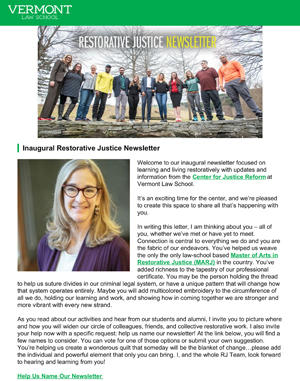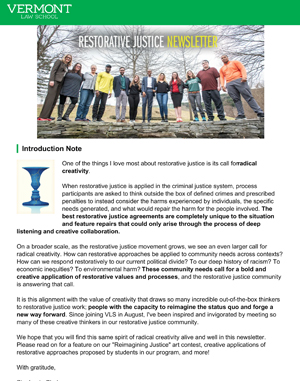On Friday, Aug. 12, the Vermont Supreme Court ruled that rock crushers operated by North East Materials Group (NEMG) on the Rock of Ages tract in Graniteville, Vt., are subject to Act 250, Vermont's landmark land use law.
The decision comes after a recent appeal brought by the Environmental and Natural Resources Law Clinic (ENRLC) at Vermont Law School on behalf of Neighbors for Healthy Communities, a group of Graniteville residents who live near the rock crushers. This is the second time the ENRLC was before the Supreme Court with the case, and the second time it won.
The NEMG rock crushers have operated without a permit for more than six years despite causing significant noise, rock dust, and truck traffic that impact neighbors who live near the crushers. The Vermont Supreme Court held that the rock crushers are a "substantial change" to pre-1970 development on the Rock of Ages tract, and therefore "NEMG is required to submit an Act 250 application and obtain an Act 250 permit to continue its rock-crushing activities."
"We're very pleased that the Vermont Supreme Court again held that the location of high-impact activities like rock crushing matters under Act 250," said Laura Murphy, acting director of the ENRLC and lead attorney on the case. "It now is clear that rock crushing at other sites far away on the tract does not exempt NEMG's present crushing and its impacts from Act 250 review."
Lori Bernier, a member of Neighbors for Healthy Communities, expressed deep respect and appreciation for the Vermont Supreme Court's final resolution in Neighbors' favor.
"We and the other neighbors of these rock crushers have endured the noise, the dust coating our houses, and the dangerous trucks for six years, all without any public review of these impacts," Bernier said. "The Supreme Court's decision gives us the chance to be heard on whether these rock crushers should operate so close to our homes."
Neighbors for Healthy Communities also worked with Toxics Action Center, a New England-based advocacy organization.
For more information about the Graniteville case, including the decision and court filings, visit vermontlaw.edu/academics/clinics-and-externships/ENRLC/cases/opposing-an-asphalt-plant-in-local-residential-community.
ENRLC attorneys and student clinicians represent clients in several other high-profile environmental cases, including the Vermont Public Interest Research Group (VPIRG) in its pursuit of a state labeling law for genetically engineered (GE) foods, and a case against a new railroad and coal mine proposed for Montana's Powder River Basin. For more information about the Environmental and Natural Resources Law Clinic, visit vermontlaw.edu/ENRLC.
###
Vermont Law School, a private, independent institution, is home to the nation's largest and deepest environmental law program. VLS offers a Juris Doctor curriculum that emphasizes public service; three Master's Degrees—Master of Environmental Law and Policy, Master of Energy Regulation and Law, and Master of Food and Agriculture Law and Policy; and four post-JD degrees —LLM in American Legal Studies (for foreign-trained lawyers), LLM in Energy Law, LLM in Environmental Law, and LLM in Food and Agriculture Law. The school features innovative experiential programs and is home to the Environmental Law Center, South Royalton Legal Clinic, Environmental and Natural Resources Law Clinic, Energy Clinic, Food and Agriculture Clinic, and Center for Applied Human Rights. For more information, visit vermontlaw.edu, find us on Facebook, and follow us on Twitter.


















